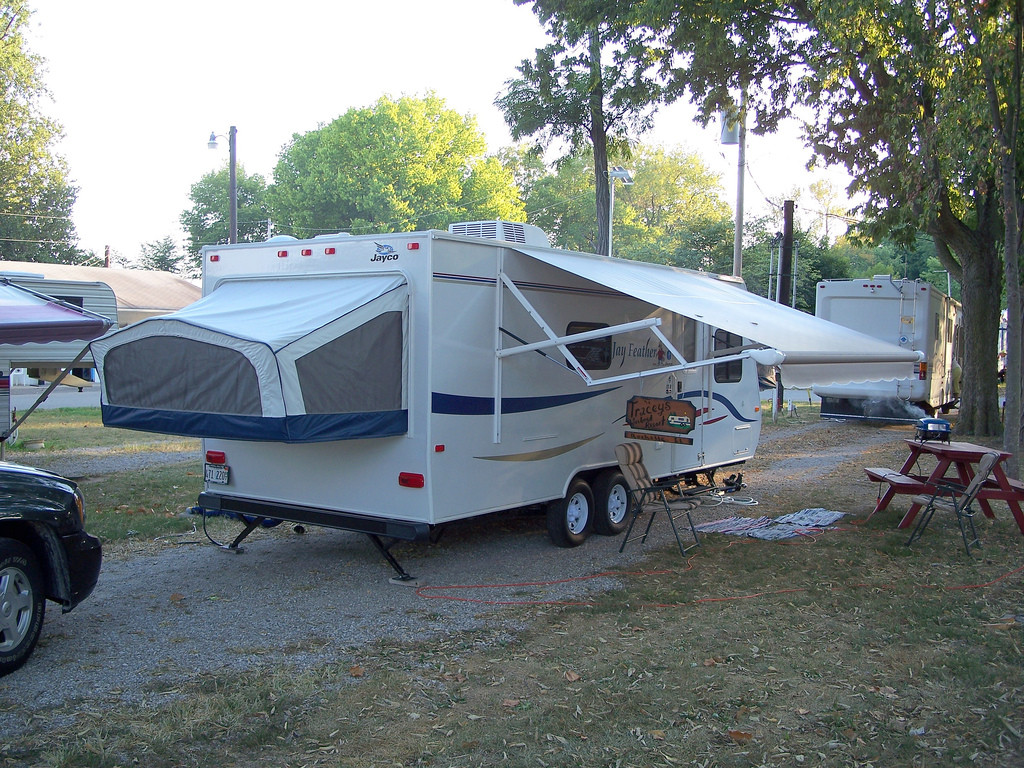When you’re in the market for a new or used travel trailer, there are a whole lot of important questions that you need to ask yourself about the features you would like to have versus those you need, how and where you’re going to store the rig, and even what colors and other design touches you’ll still be able to stomach years from now. But there’s one question that’s more important than any other: how much does it weigh?
The crux of the issue is that it doesn’t matter if a trailer is perfect in every other way–if you can’t tow it, you can’t use it. And that’s where lightweight travel trailers come into the picture. If you drive an SUV, minivan, or even a light truck, you’ll want to be sure to check how much it can actually tow, along with what hitch class it has, because chances are good that a lightweight travel trailer, or even a pop up, will be right up your alley.

Some lightweight travel trailers include pop-out sleeping areas. Image courtesy of Bill & Vicki T, via Flickr (Creative Commons 2.0)
What is a Lightweight Travel Trailer?
There’s no hard and fast rule as to what, exactly, constitutes a lightweight travel trailer, and the term lightweight is relative when you’re talking about a class of RV that can tip the scales at over 18,000 lbs, in the case of some large fifth wheels. In general terms, lightweight travel trailers typically weigh in under 4,000 lbs, and some even weigh significantly less than that, but to qualify as “lightweight,” a rig should either
- weigh less than other trailers of similar length
- simply be short and light enough for smaller vehicles to tow
In either case, the important factor at play is that lightweight travel trailers are ideally suited to smaller tow vehicles. For medium and heavy duty trucks that can tow a relatively large amount of weight, choosing a travel trailer built with lightweight construction materials and methods means that you can, theoretically, get a longer trailer, with more living and sleeping space, than you would have with a trailer built with traditional materials. And for light duty pickups and many SUVs, choosing a shorter, lightweight travel trailer may be your only choice aside from a pop up.
The Difference Between Weight and Length
It’s important to note that when talking about different types of towable RVs, lightweight doesn’t always mean the same thing as short. While it’s true that the very lightest rigs are also exceedingly short, lightweight versions of longer rigs also exist. Due to changes in construction materials and techniques, you can actually find current model year travel trailers in the 30 foot range that weigh less than 20 foot rigs from just a few decades ago. You can also find sub-20 foot rigs that weigh less than virtually anything that was available a few decades ago, with the possible exception of certain light pop up trailers, some of which are now actually just as heavy, or even heavier, than traditional travel trailers.
As an example, Coachmen’s 2015 Apex 279RLSS is a 31′ travel trailer that has a dry weight of 5,300 lbs. That may not exactly seem lightweight, especially after you add everything from water in the tanks to all your camping gear, but according to NADA, back in 1985, a Coachmen travel trailer of similar length had a dry weight of over 7,600 lbs. If you want to get down closer to the weight of the 2015 model, you’d be looking at something like the 21′ 1985 Coachmen M-21, which still weighed in at about 5,500 lbs. That’s a significant difference, especially when you consider that the 2015 model has a slide-out that adds additional weight.
How Much Can You Tow?

Big trucks can pull just about anything, but when you’re driving something smaller, you have to get creative. Image courtesy of Yolanda, via Flickr Creative Commons 2.0)
Towing ratings vary widely from one vehicle to another, but generally speaking, most SUVs and light duty pickups are capable of towing somewhere in the 2,000 – 6,000 lb range. Some SUVs, and medium and heavy duty trucks, can handle a lot more, but if you’re dealing with a light duty vehicle, lightweight travel trailers are probably going to be right up your alley. In order to figure out exactly how much trailer you can tow, there are a couple things you’ll need to look at.
First, if your vehicle’s manufacturer actually gives a tow limit, then that’s usually a pretty good number to go by. Otherwise, you need to look at the GVWR of your tow vehicle and compare that to its curb weight. The difference between those two numbers is the amount of weight you can add to the vehicle, in the form of everything from passengers and cargo to fuel, and tow behind it.
Second, you have to look at the dry weight and GVWR of any trailer that you’re interested in. The dry weight of a trailer reflects how much it should have weighed the day it rolled off the factory line, while the GVWR is the most it can safely weigh. The difference between those numbers is the limit of how much weight you can safely add, in the form of fresh water, propane, camping gear, and everything else. It’s important to note that the actual weight of a trailer has to be lower than the towing limit of your tow vehicle, but it’s equally important for the actual weight of the trailer to remain below the GVWR. So while you should be fine towing a 5,800 lb travel trailer if your truck or SUV has a towing limit of 6,000 lbs, you’re going to get yourself in trouble if you accidentally overload the trailer by 200 or more pounds. In that case, the trailer would be overloaded, and so would the tow vehicle, which could be extremely dangerous once you’re out on the road.
Looking at Some Lightweight Travel Trailers
Lightweight travel trailers are available from virtually every manufacturer out there, but for the sake of comparison, we’ll take a look at some of the models from just one manufacturer to compare lengths, weights and capacities. Here’s a quick look at some of Jayco’s 2015 Jayfeather ultralight travel trailers:
| Model | Length | Dry Weight (lbs) | GVWR (lbs) | Hitch Weight (lbs) |
|---|---|---|---|---|
| 16XRB | 18'4" | 2,540 | 3,500 | 310 |
| 18SRB | 21'10" | 3,115 | 4,250 | 300 |
| 22FQSW | 26'5" | 4,135 | 5,500 | 440 |
| 26BHSW | 30'5" | 4,733 | 6,250 | 665 |
As you can see, all of these rigs fall somewhere within the general 2,000 – 6,000 lb range, which makes them well suited to tow vehicles that simply can’t handle any more weight. For example, the 2015 Dodge Grand Caravan minivan has a towing limit of 3,600 lbs. That means that, provided it is equipped with the proper hitch, and the trailer isn’t overloaded, it would be capable of towing the Jayfeather 16XRB, but anything else would be pushing it.


